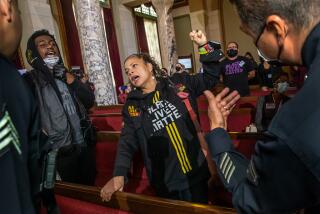Excerpts of Arguments Presented by Attorneys
- Share via
Your Honor, I think that a good starting point for this motion is with the 4th Amendment itself because, essentially, that’s what this motion is all about. It’s about the right of the people to be secure in their persons, houses, papers and effects against unreasonable searches and seizures. . . .
I think what we’re confronting here is police officers who have the 4th Amendment backwards, who believe in conducting the search first and then obtaining a warrant. . . . (But under the law that applies to police searches of private homes), the exception for emergencies or exigent circumstances is a very, very limited one. It is limited to situations in which there is an imminent threat, and the kind of entry it permits is limited by the threat that is presented. . . .
Here we have officers coming to these premises at 5 o’clock in the morning, at least six hours after the murders that they were investigating had occurred, a distance of two miles away from the scene of those murders. The victim, one of the victims of those murders, had been identified at 1 o’clock that morning, and it appears that most of the delay from 1 o’clock until 5 o’clock in the morning was consumed simply in deciding what detectives were going to investigate this homicide.
We are told that four detectives--the four detectives who were most responsible for investigating the circumstances of this homicide--all converged on the residence of Mr. Simpson simply for the purpose of informing him of the tragedy that had taken place at the Bundy location--a purpose that could just as easily have been accomplished by the placing of a telephone call. The officers claimed no exigency, no emergency until they discovered what Your Honor has seen as a one-eighth- to one-quarter-inch dried speck of substance on the door of an automobile, which could not even be confirmed as being blood after scientific investigation--a stain which was just as consistent with a dripping taco or a driver with hangnail as with any circumstances of murder, suicide or bleeding victims on the premises. . . .
Even if we concede--and we do not concede, but even if we did concede--that there were exigent circumstances justifying a warrantless entry to the premises, again, the scope of their activity on those premises is limited by that exigency. . . . (And) their mission, essentially, was accomplished prior to 6 o’clock in the morning.
They had accomplished the notification of Mr. Simpson. They had made arrangements for the well-being of the children that were the subject of concern. They had ascertained or located no other victims or no reports of any other problems. . . .
I think everything that happened from then on can only be described as investigative activity: the gathering of evidence of a crime, the precise activity that the 4th Amendment commands officers (to) obtain probable cause and a warrant before they engage in it.
Again and again we heard the detectives say, “Well, we didn’t know what we had. We didn’t know what had happened on these premises.”
Well, we know what they didn’t have--they didn’t have a search warrant. And if we were to carve out an exception to the 4th Amendment for detectives who don’t know what they have, in effect, we would turn the 4th Amendment on its head, and we would say, “The less you know, the more you can search.”
More to Read
Sign up for Essential California
The most important California stories and recommendations in your inbox every morning.
You may occasionally receive promotional content from the Los Angeles Times.













